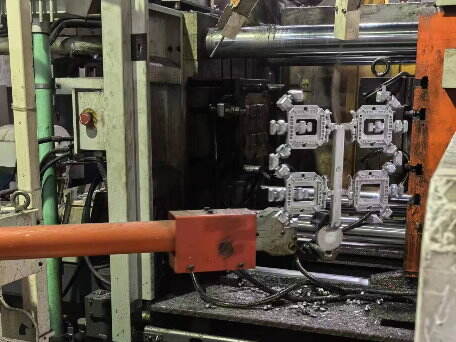Introduction
It is important that die cast metals have corrosion resistance, both to improve the life of the die Casting and to enhance the performance of the part. The most commonly used materials for Die casting are zinc alloy, aluminum, and brass, each with its own unique properties. In this article I will explore how zinc alloy corrosion resistance stacks up against both aluminum and brass, looking at what makes each alloy special and the applications that make sense for them.
Zinc Alloy Corrosion Resistance
Zinc alloy is recognized for its natural anti-corrosive properties, an edge in rusty and degenerative environments. Due to its high fluidity and cast-ability, zinc alloy can produce detailed and complex die castings with a smooth surface finish, minimizing the need for post-casting treatments that can protect against corrosion. It has superior damping capacity and vibration attenuation as compared to aluminum and brass, making it very suitable for applications where environmental resistance is important.
Why Aluminum is Resistant to Corrosion
Thanks to the protective oxide layer formed on its surface, aluminum is another metal material with good natural corrosion resistance. We all know that aluminum can produce relative corrosion resistance due to the external oxide layer. This oxide layer has a certain effect on the further oxidation of aluminum in the future. Aluminum is lower end of the scale when it comes to durability of corrosion resistance compared to zinc alloy, but is a nice middle ground for the strength-to-weight ratio and resistant to corrosion. The strength, weight ratio, and the operation at high temperature environments widens the application of Aluminum which mostly varies from the automotive to aviation industries. On the other hand, aluminum can be recycled and are friendlier to the Environment therefore giving it an advantage in sustainable industry.
Corrosion Resistance of Brass
Steel: Stainless steel contains 10% chromium making it very resistant to corrosion.—Brass: a copper-zinc alloy, varies in corrosion resistance based on the zinc content. While brass generally has superior corrosion resistance compared to copper, it is still not appropriate at replace zinc alloy or Aluminium. For applications needing malleability or form-ability, products will be made of brass instead of bronze or zinc. Robert Gardner A.MI strut. Brass is typically durable for architectural and engineering purposes because of its aesthetically pleasing nature and relatively high corrosion resistance, E continues.
Considerations Specific to an Application
To illustrate, the automotive industry prefers aluminum as lightweight and corrosion resistance contributes to fuel economy and emissions. On the flip side, industries might turn to zinc alloys due to the beneficial corrosion resistance and physical properties that are ideal for electrical and hardware applications. Brass is commonly employed in beauty and permanence applications, such as architectural fixtures and decorative components.
MATERIALS AND PROCESSING
While Zinc Alloy is actually denser than aluminum (but lighter than brass) — this key fact will explain why it is often the metal of choice in die casting processes. Another aspect is that these materials gets its melting points that relates to die casting as well since aluminum have a higher melting point than zinc which may also cause a difference in energy consumed or die processing time. The other factor is thermal conductance, the aluminum has much better heat transfer than zinc or brass, important in applications where heat must be removed.
Finish an Appearance
In addition, they have lower cost associated with processing, also they have initial surfaces with smooth finish owing to their die castings thus the zinc based die casting products need very little post-process material processing. It just means that more has to be done with the finishing, unlike aluminium and brass. A significant time- and cost-saving advantage of zinc alloy is that it allows for a high-quality finish right in the die casting process.
Cost and Environmental Impact
Cost — Due to lower raw material costs, zinc alloy is typically cheaper to produce, not to mention the reduced need for finishing treatments after casting. Aluminum which is eco-friendly because of its recyclable, and it plays a role in saving energy due to its low weight, although expensive.
Conclusion
Although zinc alloy die castings, aluminum, and brass corrosion resistance is individual based on type, consider that when trying to figure out who wins, the right job calls for value, and corrosion resistance. Aluminium offers more of a corrosion-versus-weight tradeoff, while brass equally balances aesthetics and corrosion resistance, but zinc alloy shines where high corrosion protection is called for. Based on Low performance Black body, Commercial Blackbody, Commercial Simulator, and Low-cost Simulator. Each Category defines the material used in it. All these considerations will have to be taken into account while selecting materials to meet the optimum performance and longevity requirements for the application specific industry die casting requirements.

